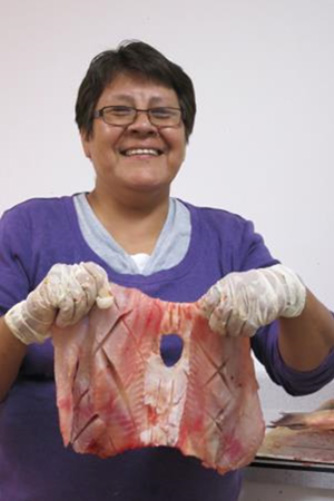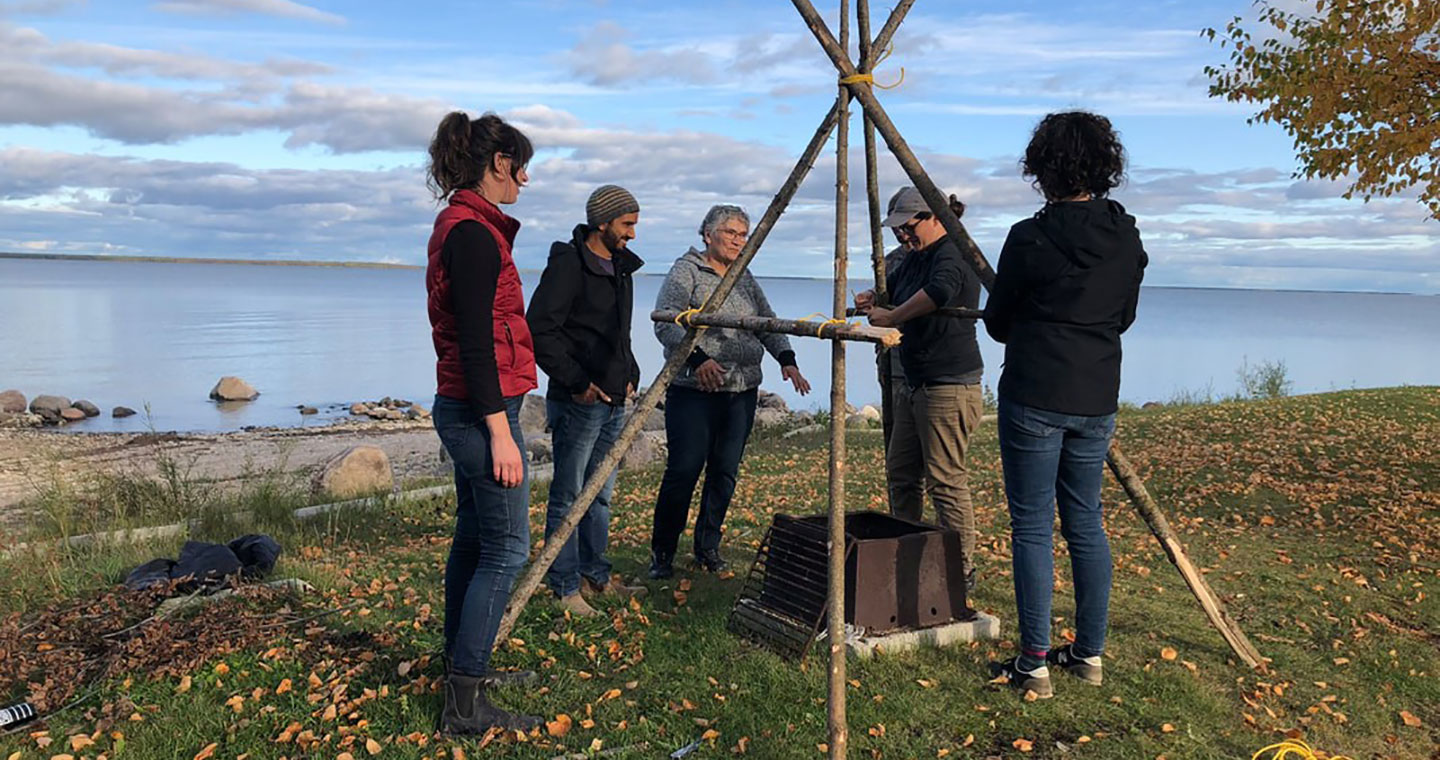The Northern Manitoba Food, Culture, and Community Collaborative (NMFCCC) envisions a world where northern communities are healthier and more resilient, and our relationships are mutually transformative. Together, we support Indigenous food sovereignty, empowerment of youth, connection to the land, and cultural resurgence.
The NMFCCC is made up of community members, northern advisors, funders, and organizations working together to support community-led action on food security for economic, cultural, and health outcomes.
It began as a pilot in 2013 and became a fully-realized collaborative in 2014. An essential part of our journey as a Collaborative was documenting our methodology in a Theory of Change and describing our collective efforts and the community-led vision for change. Over the course of seven years, we’ve discovered that how we work is just as important as the work that we do.
During a learning trip in September 2016 to the territory of Opaskwayak Cree Nation, the Evaluation Committee led us on the first deep, in-person discussion about our Theory of Change. It was a nearly four-year process of conference calls, emails, in-person meetings, and learning trips involving the Evaluation Committee, Northern Advisors, and at times, all Collaborative members to develop the theory. The process we used to create the Theory of Change was important because it reflected our group values and a way of working that the Collaborative’s Northern Advisors have shared. The Collaborative worked methodically and ensured all voices were heard, we worked relationally with the intent of learning from and with each other.
Below are the key lessons and reflections we took away from the process of developing the Collaborative’s Theory of Change. These and stories from each community are also shared in the Collaborative’s latest Community Stories publication.
- Start with your values. The Collaborative’s values are to be relational, committed, collaborative, reciprocal, and considerate in all aspects of our work. It was necessary to ground our Theory in our values and ensure they were well reflected throughout.
- Concentrate on your primary goal. The Collaborative’s dual outcomes of bringing about community wellness via food security and related community economic development, and of impacting philanthropic practice and knowledge were not readily agreed upon. The latter at first seemed jarring to many around the circle. Questions arose such as, “What does it mean to ‘decolonize philanthropy?’ Was this what I signed up for?” Happily, the goal of supporting community change via food projects was an easy agreement. Much more conversation was required before we could come to consensus, understand, support, and describe our own change in terms of philanthropic practice and awareness.
- Focus on the positive. The typical approach to creating a Theory of Change is to focus on the problems we wanted to fix. The Indigenous people in the room (and on subsequent conference calls and meetings) gently explained that the time for a problems-focused approach had passed. People are aware of the problems and want to focus on creating opportunities and solutions to make change. As a group, we needed to shift our hearts and language to a strengths-based approach.
- Make it inclusive and accessible. The initial draft Theory of Change was not something that community members felt proud of or saw themselves in. The language was academic and paternalistic. People did not want to be the subject of a Theory of Change or ‘do gooder’ actions: they desired to be recognized as strong partners and visionary leaders of positive change. The Collaborative sought to transform the traditional “top-down” model of philanthropy by involving community and operating with values of reciprocity and collaboration.
- Be prepared to unlearn. A linear Theory of Change did not jive with an Indigenous worldview that emphasizes interconnectedness. We had to retrain our brains to think differently. We needed a Theory of Change that embraced a circular model to accurately reflect the nuances of our work.
This process was critical for the Collaborative, as we learned, unlearned, and developed a new understanding and common agreement about our work. The Theory of Change has become a touchstone for our work. It is regularly referenced by funders, Northern Advisors, and staff in various aspects of our work including our grantmaking, reporting, and evaluation.
We view the Theory of Change as a living document that grows and changes based on our evolving understanding of our work, and community needs.

The main actions we take together as a Collaborative are:
Flexible funding for community-led food projects
Since 2014, more than $2.5 million in flexible philanthropic funding has reached more than 55 community-led projects. More than 75% of partners had not received philanthropic funding prior to their partnership with the NMFCCC: the fact that communities in the northern boreal region are deeply underserved philanthropically was a key motivation to create the NMFCCC back in 2013.
Supporting North-to-North learning
Communities gather on their traditional territories to share ideas, knowledge, stories, and teachings. They are weary of being ‘brought down to Winnipeg’ to receive knowledge from southern experts and we are working to support gatherings that are by and for northern people. Additionally, we support self-representation at important gatherings related to northern issues and food sovereignty.
Story Sharing
Communities prioritize telling the good news; there are not enough positive stories being shared. We annually create and share stories of the beautiful work communities are leading. We also regularly support conference calls to share knowledge with one another.
Deep funder (un)learning
Through immersive learning trips, community sharing, and a commitment to putting community needs at the center of this work, members have had (self-described) life-changing learning experiences that improve their ability to be impactful philanthropists.
Together, we continue to learn and unlearn from the lessons of the past — of top-down approaches, of one-size-fits-all funding or reporting, of making assumptions without taking the time to really get to know each other, of separation of people from language, culture and resources. By working relationally, patiently, collaboratively, and with commitment to each other, we are supporting deep change. We are proud to be part of the foundation to the growing community-led food sovereignty movement in Northern Manitoba.
The 2018/2019 NMFCCC Community Stories booklet is now available. Learn more about NMFCCC and MakeWay’s work with Collaboratives.
